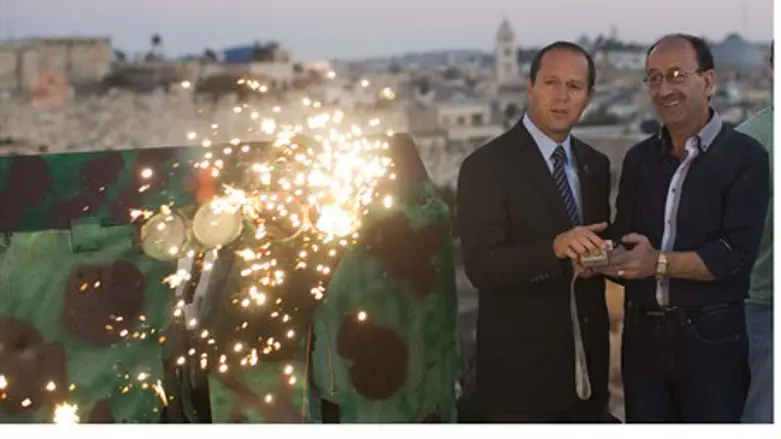
As Israel makes "historic" concessions to Muslim populations in Judea, Samaria and Gaza in allowing direct access to the Temple Mount - the holiest site in Judaism - for the Muslim fast month of Ramadan that begins Thursday, the Jerusalem municipality is making its own special preparations to enhance the aesthetic experience of Arab visitors.
Between 150,000 to 200,000 Muslims are expected to visit the Al-Aqsa Mosque on the Mount each Friday of the month according to Jerusalem Councilman Arieh King, presenting a great logistics and security challenge, but Jerusalem Mayor Nir Barkat is gearing up for a full festive mood.
Barkat is to fire the historic Ramadan cannon next Tuesday with Haj Yahya Sandouk, to mark the evening's end of the daily fast for Muslims. The firing will take place at the cemetery on Salah ad Din Street, next to the police station, according to an official statement.
The statement noted that two cannon shots are fired at sunrise and sunset every day of Ramadan to mark the start and end of the fasting times.
The Haj Yahya Sandouk family has reportedly held the role of firing the cannon in Jerusalem on Ramadan and Eid al-Fitr - the holiday marking Abraham's "sacrifice of Ishmael" in a Muslim appropriation of the original Torah story - for 120 years, since the time of the occupation of Israel by the Ottoman Turks.
Barkat said that "this year has shown a pronounced increase in preparations by the municipality for the month of Ramadan. This is evident in the significant financial outlay and in the large work force employed for this important task. The welfare of all the pilgrims to Jerusalem is a major priority for us. I wish the Muslim residents of eastern Jerusalem a Ramadan Kareem."
Expensive aesthetic preparations
The mayor outlined the major preparations, saying the municipality is "taking care of: benches, shade and water fountains for the use of those praying and going up to the Temple Mount. Additionally, festive lights have been strung across the central sites in the city, including: Damascus Gate, Sultan Road and Rabaa al Adawiya Street. The Urban Landscape Department has performed repairs on the roads and worked toward closing street holes on the main routes including: Salah-A-Din Road and Ras Himis Road. The municipality has also improved the large parking lot in Wadi Joz where there will be free parking in order to ascend to Temple Mount by foot."
Expensive preparations to improve the visual experience of visiting Muslims are also to include "cleaning of the large parks including removing trash from the eastern Jerusalem neighborhoods. There will be daily cleaning of the sidewalks and routes leading towards the entrance to the Temple Mount, in addition to the larger cleaning projects being carried out by the community councils."
Barkat added the municipality Culture Department is also organizing festivities around the Old City, and "community councils are organizing joint neighborhood Iftar meals and festivities in public spaces. In the evenings, the sports department is organizing football league games for youth and sports fields at schools will be open for the public to use."
"During the month of Ramadan, street vendors in Jerusalem's Old City will be allowed to display their wares at the Palm Market next to Damascus Gate. The Merchants Committees will receive help and support from the Department for Business Promotion at the Municipality. In addition, the Social Services will hand out food coupons for those in need," he concluded, detailing the lavish preparations.
The glowing enthusiasm shown by the mayor brings to mind the statements on Ramadan made by President Reuven Rivlin on Tuesday at the Jordanian Embassy in Tel Aviv in time for Jordanian Independence Day.
At the event Rivlin praised the "beauty, kindness and mercy" of Islam, adding "my late father was a great scholar of Islam. His Muslim friends told me, that he fasted during Ramadan when visiting his Muslim friends, only because of the deep respect he felt for his Muslim friends and neighbors."